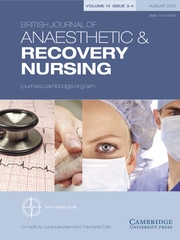No CrossRef data available.
Article contents
We (Theatre Health Care Professionals) are the Patient's Advocate: Fact or Fiction?
Published online by Cambridge University Press: 25 February 2009
Abstract
The word ‘advocacy’ is often used in hospitals. The author's practice has always been to treat the patient as he would like himself or a member of his family to be treated, but is this being an advocate? This article will examine the concept of advocacy and its relevance to the perioperative arena. In the view of the author, protecting a patient's dignity, being aware of tissue viability, ensuring the right patient receives the right treatment, monitoring of vital signs, correct patient positioning etc. are all a part of our duty of care.
- Type
- Original Article
- Information
- Copyright
- Copyright © British Association of Anaesthetic and Recovery Nursing 2004


